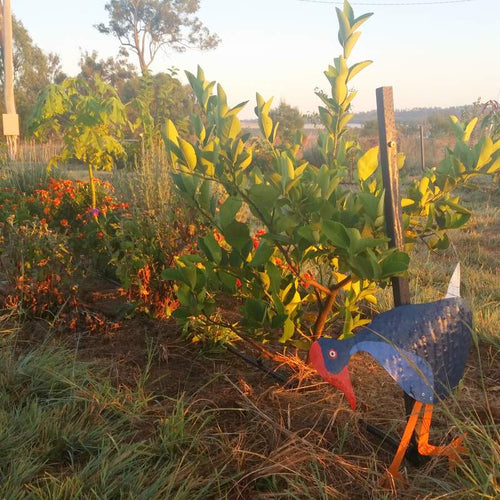How I use herbs - lemon balm
Lemon balm (Melissa officinalis) is part of the mint family (Lamiaceae), and even though I already wrote about mint, peppermint andspearmint in my garden, at the time I didn’t have lemon balm. I only recently got a cutting from Pete’s parents and its doing really well in my garden now. It hasn’t flowered for me yet, but apparently the genus name (Melissa) is Greek for 'honey bee', because the flowers attract bees.
How to grow lemon balm
Lemon balm is propagated very easily by root division. It has similar requirements to mint, preferring a cool damp area of the garden. If you grow it in a pot, make sure that the soil stays moist. It doesn’t spread with runners like mint, but just grows into a larger clump, so it is easier to control. Keep pruning the excess growth to keep it as a small bush and not too tall. I have read that lemon balm is frost sensitive, but mine grew through winter here, so maybe it can tolerate light frost, and it can grow back after a cooler winter if it does die off.
How to use lemon balm
Lemon balm tastes a little like mint, but with a more lemon-y flavour. I dry the leaves and use it for tea because I like the flavour. I will also chop it up with other herbs to use as a fresh garnish on salad, in yoghurt sauce and to casseroles and soups.
Due to the wide range of chemical constituents in lemon balm, it has a reputation for several healing properties:
For a herb that’s relatively easy to propagate and grow, it has a huge range of benefits and it tastes nice, so I am very happy to have it in my garden.
How to grow lemon balm
Lemon balm is propagated very easily by root division. It has similar requirements to mint, preferring a cool damp area of the garden. If you grow it in a pot, make sure that the soil stays moist. It doesn’t spread with runners like mint, but just grows into a larger clump, so it is easier to control. Keep pruning the excess growth to keep it as a small bush and not too tall. I have read that lemon balm is frost sensitive, but mine grew through winter here, so maybe it can tolerate light frost, and it can grow back after a cooler winter if it does die off.
How to use lemon balm
Lemon balm tastes a little like mint, but with a more lemon-y flavour. I dry the leaves and use it for tea because I like the flavour. I will also chop it up with other herbs to use as a fresh garnish on salad, in yoghurt sauce and to casseroles and soups.
Due to the wide range of chemical constituents in lemon balm, it has a reputation for several healing properties:
- calming and used to aid sleep (more here)
- antibacterial and antiviral (more here)
- anti-inflammatory (more here)
- digestion (more here)
- memory and cognitive function (more here)
- soothing for skin (more here)
For a herb that’s relatively easy to propagate and grow, it has a huge range of benefits and it tastes nice, so I am very happy to have it in my garden.
Do you grow lemon balm? Do you use lemon balm?
























Leave a comment